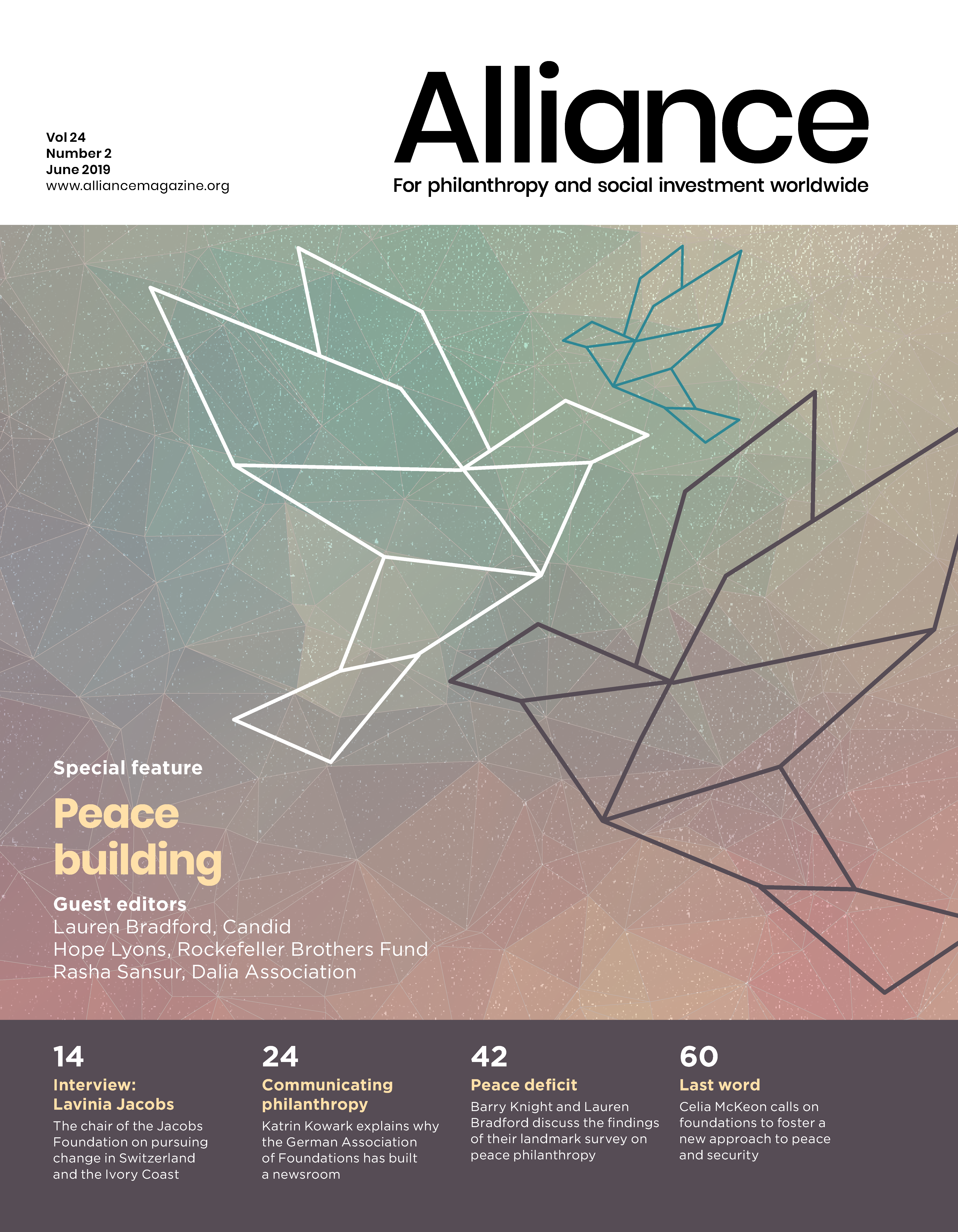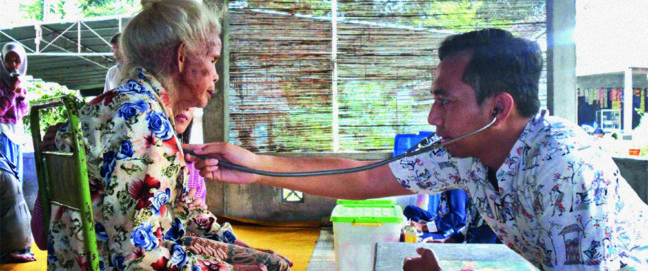Solidarity donors are key to reclaiming peace-building in Palestine as international aid has undermined Palestinian identity
As my taxi rounded the hairpin turns of the Wadi al-Nar highway between Bethlehem and Ramallah, I spotted one of the ubiquitous US Agency for International Development (USAID) signs proclaiming that this road was ‘a gift from the American people’. The dubious nature of this gift became apparent as the highway wound along the barbed-wire-topped Israeli separation wall, and Ma’ale Adumim, the largest Israeli settlement in the West Bank. In 2016, the director of a Palestinian civil society organisation told me that she refused to apply for USAID funding because the US hypocritically allowed Israeli settlements to expand on Palestinian land. ‘They give money for roads,’ she said, ‘but these roads separate us even more than before.’ During the second intifada (uprising), Israel built several new checkpoints along this road, further restricting Palestinians’ freedom of movement. Donors’ developmental and peace-building projects in the Israeli-occupied West Bank are fraught with this kind of ambivalence.
Since the 1993 Oslo peace agreement, international donors have given over $30 billion in aid to the occupied Palestinian territories (oPt) of the West Bank and Gaza Strip. This ‘peace dividend’ was intended to help establish an independent Palestinian state through economic development and by cultivating a democratic civil society. Instead, the Palestinian economy deteriorated during the Oslo period, while the NGO-isation of civil society demobilised social movements. The collapse of the peace process and expansion of Israeli settlements in the West Bank have further diminished prospects for peace.
Rather than contributing to a just peace, donor interventions into the curriculum and PA security apparatus facilitate Palestinian cultural and territorial dispossession, and echo the divide and conquer practices of British rule during the mandate period.
Foreign aid has failed to contribute to peace because its primary purpose is not to support Palestinian self-determination, but peace-building as counterinsurgency. Donor support for the Palestinian Authority (PA) government in the West Bank requires that the PA coordinate its security operations with Israel. The PA has been criticised for violently cracking down on Palestinian protestors, and for failing to investigate Israeli settler violence against Palestinians. This explains why the US decision over the past year to end all of its foreign assistance programmes to the oPt might paradoxically help peace.
Donor funding for the PA educational curriculum enacts a similar logic of control, repressing Palestinian nationalism in the name of ‘peace education’ to promote coexistence with Israel. Textbooks have been largely sanitised of controversial political content. This donor depoliticisation of Palestinian history and identity runs counter to the emancipatory principles of peace-building. Rather than contributing to a just peace, donor interventions into the curriculum and PA security apparatus facilitate Palestinian cultural and territorial dispossession, and echo the divide and conquer practices of British rule during the mandate period.
Solidarity donors build long-term funding relationships with their recipients, freeing organisations from the constraints of project-based funding.
Until recently, the US was the single largest donor to the Palestinians, providing approximately $200 million in aid each year. The withdrawal of that assistance negatively affects Palestinian refugees and others who depend on foreign aid, but it also removes the largest source of funding to the failed Oslo aid model, presenting an opportunity for donors to shift their approach from the current ‘peace-building as counterinsurgency’, to peace-building and development to support Palestinian self-determination.
Government aid agencies can support grassroots peace-building projects by following the lead of ‘solidarity donors’, a group of smaller foundations and progressive state development agencies in the oPt who share their recipients’ visions of development as a long-term process of social and political change. Solidarity donors build long-term funding relationships with their recipients, freeing organisations from the constraints of project-based funding. Solidarity donors also value downward accountability to their recipients, and align themselves with movements, rather than imposing their own agendas on civil society. As a result, they gain legitimacy and efficacy from supporting projects that reflect social movements’ priorities.
In the oPt, solidarity donors follow the community giving model of Palestinian cultural and developmental foundations like the Dalia Association, the A M Qattan Foundation, Taawon and others. For instance, the Rosa Luxemburg Foundation’s Palestine office funds emancipatory education projects, through Palestinian organisations that use community-based education and participatory learning to cultivate civic agency. These educational organisations help maintain Palestinian cultural identity by re-introducing Palestinian history and identity into education in the informal spaces around the PA curriculum.
Donors can contribute to a just peace in Israel-Palestine by looking beyond NGOs to form alliances with social movements and community-based organisations engaged in grassroots peace-building.
This solidarity-based approach re-centres peace-building within Palestinian communities. Recipient organisations also play an important role in pushing donors to give aid with fewer conditions. When a donor told a Palestinian theatre NGO that they could not use the terms ‘apartheid’ or ‘settler-colonialism’ in a play, the NGO refused to accept the donor’s funding. Ultimately the donor compromised by providing the money, but asked that their name be removed from the production. Similarly, volunteers at a human rights advocacy organisation received a video camera and film production training from an international donor. The donor’s name was left off the documentary, and at the screening the donors sat in the audience. Both these examples of the donor taking the backseat show how donors and recipients can work together to disrupt the hierarchy of the donor-recipient relationship. They challenge the power relations inherent in civil society organisations’ structural dependence on aid.
Donors can contribute to a just peace in Israel-Palestine by looking beyond NGOs to form alliances with social movements and community-based organisations engaged in grassroots peace-building. In the 26 years since the Oslo peace agreement, donors have exacerbated the political, economic and humanitarian situation in the oPt by re-enacting colonial domination under the guise of development and peace-building. We would do better to follow the lead of solidarity donors and the Palestinian movements who are reclaiming peace-building to support Palestinian rights, even under the restrictive conditions of aid dependence, military occupation and settler colonialism.
Melanie Meinzer is a postdoctoral fellow in Environmental Studies at Denison University.
Email: melanie.s.meinzer@gmail.com






Comments (0)